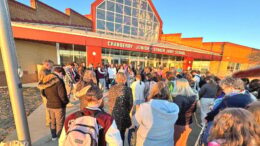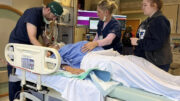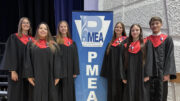NEW CASTLE (AP) — Some high school students are learning to make robots and three-dimensional items using laptop computers and other technology.
At the Lawrence County Career and Technical Center, members of one class are getting their hands dirty, learning to drill for oil and gas.
A three-year course that started four years ago at the vocational-technical center is giving interested students new career avenues and allowing them to look beyond high school graduation, toward a field that is wide open in the job market.

In a May 4, 2018 photo, students of the oil and gas course at the Lawrence County Career and Technical Center climb to the top of the 36-foot gas and oil drilling rig they built in New Castle, Pa. (AP)
Two classes of 11 total students and their instructor, Jay Parsons, invited representatives of the oil and gas industry, state legislators and parents to the school Friday as they demonstrated drilling with a one-of-a-kind rig in a back parking lot off their shop.
Dave Simpkins, 16, a sophomore in the class, said that he joined the class halfway through, about four or five months ago. At first he had thoughts of going into the military after high school, but when he enrolled in the school’s oil and gas program, he discovered a passion for it and it opened his eyes up to new career opportunities.
“I love it,” he said. “It’s amazing.”
“I felt like I needed to get my hands dirty,” Simpkins said about his choosing the course. “Plus the money’s right and there’s a massive demand for it. I love getting dirty and we are all family here.”
Simpkins noted that when he graduates, he could opt go out and be an oil tender or a roughneck in the drilling industry. Or he could still join the Air Force and put his skills to use, he said.
Before Parsons started teaching oil and gas at the Career and Technical Center, he worked in the oil field in the Marcellus industry, and before that he taught school for five years. He now has a chance to combine his teaching skills with his drilling knowledge.
The students work hands-on in an industrial environment under Parson’s leadership.
His students learn gas and oil leasing, drilling, flowbase, sales, fracking and about the world of oil – not just in Lawrence County, but also how oil in Russia and Saudi Arabia affect what happens in the United States, he said.
“They learn all aspects that go into the petroleum industry, so they can get out of school and land good-paying jobs.” he said.
Parsons has had 11 graduates so far, and some of them are working in the oil fields, some went into the military and some went into the business of heavy equipment, he said.
“I try to teach more than just oil and gas,” said Parsons, whose passion for the job takes him from his home in Oil City to the school in New Castle’s East Side every day. “I teach how things relate, like how prices of gasoline affect the price of steel.”
He also teaches safety, he said, adding, “We have a lot of oil and safety companies that help us.”
Represented at Friday’s demonstration were Hilcorp Energy, Columbia Midstream of TransCanada, the Pennsylvania Independent Oil and Gas Association and the CEC. Bryan P. Hazelwood and Eric Feltner, trained pilots, were there operating a sophisticated drone with a high-powered camera that is used to fly over rigs, processing plants and topography.
The oil and gas students started in November building the 35 1/2-foot-tall oil and gas rig themselves.
“They put up every piece of steel, and they drilled every hole,” Parsons told the group.
The first petroleum well was drilled in Titusville in 1869, Parsons said, and “Uncle Billy” did all the work. Thus, the students named their rig’s engine Uncle Billy. The 1927 engine also was completely rebuilt by the students.
“They don’t build this style of engine anymore,” he said, “but the old guys want the new kids to know where they came from.”
“This is something you don’t see every day,” Parsons explained about the drill rig. “This is the only one of its kind in the whole United States.”
He knows this because he checked everywhere.
“Only two schools in the United States have learning rigs, and both are colleges,” he said. One of those, Penn College, is discontinuing its program and Parsons has ambitions of acquiring its rig to use with the one the students built, he said.
He stressed the importance of students learning the gas and oil drilling trade.
“There are so many oil field jobs, and any of my kids can have an oil field job right after they graduate,” he said. “I want them to have as real of an experience as they can have while they are in school.”






































